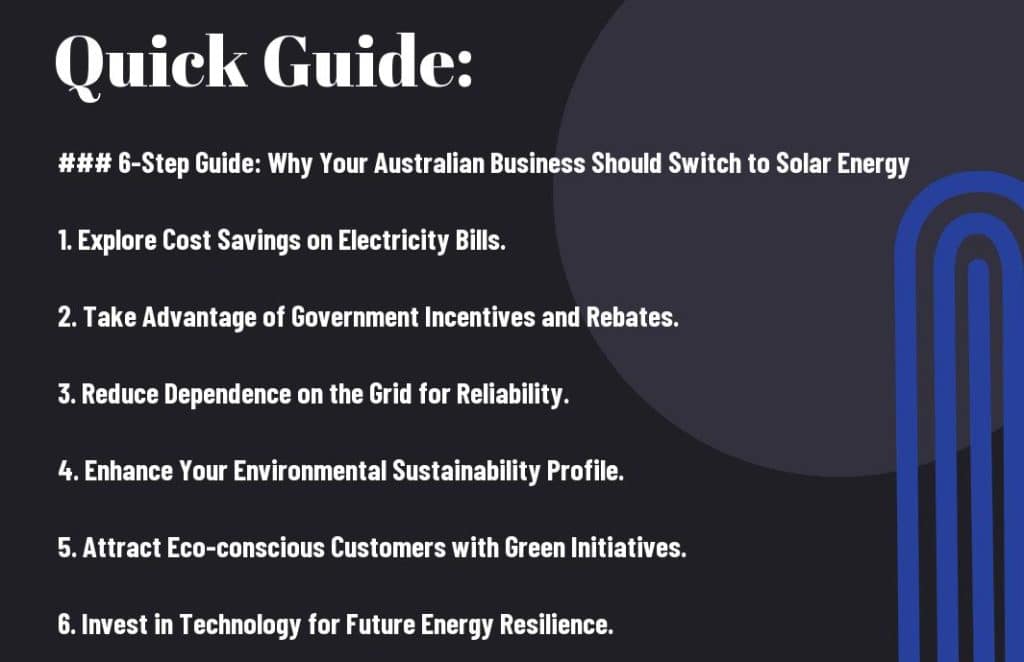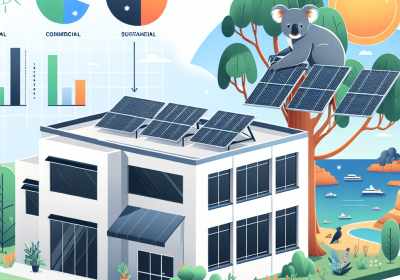Why Should Your Australian Business Consider Switching to Solar Energy?
Over the past few years, solar energy has emerged as a popular solution for Australian businesses seeking to reduce costs and enhance sustainability. With rising energy prices and growing environmental concerns, you have an opportunity to make a significant impact by switching to solar. This guide will explore the numerous benefits of adopting solar energy, from financial savings to boosting your brand reputation, helping you make an informed decision for your business’s future. For tailored advice, visit OneAu Energy to learn more about your solar options.
Key Takeaways:
- Switching to solar energy can lead to significant cost savings for your Australian business by lowering electricity bills and providing long-term financial benefits.
- Take advantage of various government incentives and rebates, such as the Small-scale Renewable Energy Scheme (SRES), which can make solar adoption more financially viable.
- Investing in solar energy not only helps reduce your carbon footprint but also aligns your business with sustainability goals, enhancing your corporate social responsibility profile.
- By embracing solar energy, you can achieve greater energy independence, reducing reliance on the grid and ensuring a more reliable power supply for your operations.
- Enhancing your business reputation and attracting eco-conscious customers can be easily achieved through sustainability initiatives like switching to solar, making a positive impact on your branding.
Explore more about integrating solar solutions into your business by visiting One AU Energy.
Understanding Solar Energy
What is Solar Energy?
Clearly, solar energy is the energy harnessed from the sun’s rays, converting sunlight into usable electricity or heat. It’s one of the most abundant and renewable resources available, making it an attractive option for businesses looking to reduce their operational costs while embracing sustainable practices. In Australia, where sunlight is plentiful, the adoption of solar energy has surged as businesses seek to leverage this eco-friendly resource to lower their energy bills and make a positive environmental impact.
How Does Solar Energy Work?
Even a basic understanding of solar energy’s mechanics can help you assess its suitability for your business. Solar panels, primarily composed of photovoltaic (PV) cells, absorb sunlight and convert it into electricity. This electricity can either be used immediately to power your operations or stored in battery systems for later use. For businesses, this means a significant reduction in reliance on the grid and a hedge against rising electricity costs.
Energy generated through solar PV systems can significantly reduce your electricity expenses, with many businesses witnessing a reduction of up to 50% in their power bills. With advances in technology, the efficiency of solar panels has improved dramatically, allowing for greater amounts of energy generation even in less-than-ideal weather conditions. This reliability makes solar energy not only a cost-effective choice but a smart one for future-proofing your business against unforeseen energy price hikes.
Types of Solar Energy Systems
While considering solar energy, you should be aware of the various types of solar energy systems available. Each system has unique features and advantages, depending on your business’s energy needs and structure. The following table outlines the primary types of solar energy systems:
| Type | Description |
| Grid-Tied Systems | Connect directly to the utility grid and allow you to draw electricity when needed. |
| Off-Grid Systems | Standalone systems that provide complete energy independence without grid connection. |
| Hybrid Systems | Combine grid-tied and off-grid options, usually incorporating battery storage. |
| Solar Water Heating | Use sunlight to heat water, which can reduce energy costs significantly. |
| Concentrated Solar Power (CSP) | Utilises mirrors or lenses to focus a large area of sunlight, producing heat energy. |
Any of these systems can provide a tailored solution based on your specific business requirements.
Does your business lean towards integrating renewable energy? Understanding the types of solar systems can help you make a well-informed decision. Here are a few factors to consider when evaluating each system for your needs:
- Energy consumption patterns in your business.
- Initial investment and long-term savings.
- Space availability for installation.
- Access to government incentives.
- Ability to incorporate storage solutions.
Any of these factors will play a vital role in determining the most efficient and cost-effective solar solution for your business. For comprehensive advice and solutions tailored to your unique needs, consider reaching out to [OneAU Energy](https://oneauenergy.com.au/).

Benefits of Switching to Solar Energy
After weighing the growing trends and advantages of solar energy, it’s clear that Australian businesses have much to gain from making the switch. As energy costs continue to rise and environmental concerns become increasingly pertinent, adopting solar technology presents a viable solution that caters to both financial and ethical needs. Your business can benefit in numerous ways, from significant cost reductions to enhanced brand reputation and sustainability.
Cost Savings
The financial advantages of switching to solar energy are compelling. By installing solar panels, you can drastically lower your electricity bills, allowing for substantial savings over time. In fact, many Australian businesses have reported up to a 50% reduction in their energy expenses after adopting solar solutions. This decrease results in long-term benefits, reducing your reliance on the grid and making your energy expenditures more predictable.
Additionally, the Australian government offers various incentives and rebates, including the Small-scale Renewable Energy Scheme (SRES), designed to encourage businesses to invest in solar technologies. These financial aids not only reduce the initial installation costs but can also provide tax benefits and deductions, making solar energy an attractive financial investment.
Environmental Impact
On top of financial benefits, switching to solar energy significantly reduces your carbon footprint. By harnessing the power of the sun, your business can actively contribute to decreasing greenhouse gas emissions, ultimately aligning with global sustainability goals. This not only positions your company as an environmentally responsible entity but also enhances your appeal to increasingly eco-conscious consumers.
This commitment to sustainability can also help you meet mandatory environmental regulations and earn green certifications such as Green Star or NABERS. These recognitions can bolster your brand’s reputation and demonstrate your dedication to ethical business practices.
Energy Independence
If you’re looking to improve your business’s energy security, switching to solar is an effective strategy. By reducing your dependence on the grid, you can shield your operations from fluctuating energy prices and mitigate risks during peak demand times or energy shortages. This independence fosters greater stability in your energy costs and operations.
Another advantage of going solar is the potential for battery storage systems. Pairing your solar panels with batteries ensures a continuous power supply, allowing your business to maintain operations even during unexpected power outages. This resilience can provide peace of mind and operational continuity in critical times.
Increased Property Value
There’s also a significant impact on property value when your business switches to solar energy. Properties equipped with solar panels are often valued higher than those without, making them more attractive to eco-conscious investors and tenants. This enhancement can provide your business with a competitive edge in the real estate market.
Energy-efficient buildings are becoming increasingly desirable, and solar installations can play a key part in appealing to potential buyers or renters. As sustainability rises in importance, having solar capabilities may also lead to quicker sales and better leasing opportunities, ultimately benefiting your bottom line.
For more information on how solar energy can positively impact your business, consider reaching out to One AU Energy for a tailored consultation. They can guide you through your options and help assess your specific energy needs.
Factors to Consider Before Switching
For businesses contemplating a transition to solar energy, understanding the factors involved is imperative. While the advantages are numerous, it’s important to carefully consider the specifics of your situation to ensure a successful implementation. Key aspects to evaluate include the following:
- Initial costs and financing options
- Location and sunlight exposure
- Size and type of installation
- Potential disruptions during installation
Thou have the opportunity to not only enhance your energy strategy but also align with broader environmental and economic goals.
Initial Investment and Financing
Before making a switch, understanding the financial implications of installing solar panels is imperative. The initial investment can be significant, often costing thousands of dollars. However, various financing options are available, such as solar loans or leasing arrangements, which can reduce the upfront burden. Investigating government incentives such as the Small-scale Renewable Energy Scheme (SRES) can further offset your costs and improve the return on investment.
Additionally, it’s beneficial to assess the long-term savings you will achieve through reduced energy bills, which could quickly recoup your initial investment. You should also consider speaking with financial experts or organisations like OneAU Energy, who can provide tailored advice and help find the best financing solutions for your business.
Location and Sunlight Exposure
Now, the effectiveness of a solar energy system largely depends on your geographical location and the amount of sunlight your area receives. Businesses located in regions with high sun exposure are likely to see better energy production and, as a result, greater financial savings. It’s important to evaluate your site’s specific conditions, including shading from nearby buildings or trees that could affect solar panel performance.
Understanding your location’s average sunlight hours will help you gauge the potential energy generation. Typically, areas that receive consistent sunshine will yield better results, making solar a more lucrative option. Engaging with solar specialists can provide insight into whether your location is viable for solar technology.
Size and Type of Installation
Even when considering the switch to solar energy, the size and type of installation suitable for your business require thoughtful assessment. The energy needs of your operations play a significant role in determining the system size you require. A larger installation might be necessary for those with higher consumption, while smaller businesses might opt for a more modest system.
To ensure you have the right setup, it’s beneficial to conduct an energy audit. This will provide clarity on your current energy usage, allowing professionals to recommend an installation that meets your specific needs and maximises energy savings. Engaging with providers like OneAU Energy can help streamline this process, ensuring that your system is both efficient and cost-effective.
Solar Energy Incentives and Rebates in Australia
Unlike many other investments, switching to solar energy can be financially rewarding for your business, thanks to several government incentives and rebates available in Australia. The Australian government has prioritized the adoption of renewable energy sources, aiming to cut down carbon emissions and promote sustainability. As a result, various financial incentives are in place to help businesses ease the initial costs associated with solar installations, making it not only a smart environmental choice but also a financially savvy decision. With rising energy costs and increasing environmental concerns, these incentives serve as a much-needed support system for companies looking to make the switch to solar.
Government Grants
You may be eligible for government grants specifically designed to support businesses transitioning to solar energy. These grants can cover a portion of your installation costs, making solar panels more accessible. Grant programs vary across states and territories, so it’s advisable to check with local authorities or a trusted solar provider like OneAU Energy for the latest offerings tailored to your location and business needs. Taking advantage of these grants can accelerate your return on investment and significantly enhance the affordability of adopting renewable energy.
Feed-in Tariffs
An attractive feature of installing solar panels for your business is the opportunity to take advantage of feed-in tariffs. These tariffs allow you to sell any excess electricity generated by your solar system back to the grid, providing an additional revenue stream. Depending on your state, the feed-in tariff rate can vary, but they can have a profound impact on your overall energy savings and financial return. Many Australian businesses have found this beneficial, not only for their bottom line but also for their sustainability goals.
Rebates associated with feed-in tariffs can significantly enhance the financial incentive to switch to solar energy. By generating your own electricity and receiving payments for excess energy you produce, you can offset your electricity bills while contributing to grid stability. This mutually beneficial arrangement not only supports a greener energy future but also bolsters your cash flow, allowing you to reinvest into your business.
STCs (Small-scale Technology Certificates)
You may also be eligible for Small-scale Technology Certificates (STCs) when you install solar panels, which can provide substantial savings. STCs are created for eligible solar energy systems and can be traded to other energy retailers, effectively reducing the upfront costs of your solar installation. The number of certificates you can claim depends on your system size and the location of your business, making it crucial to understand how many STCs you can access to maximize your benefits. This can be a significant financial advantage as you look to cut operational costs and implement sustainable practices.
Feed-in tariffs and STCs represent just a portion of the financial landscape that supports your transition to solar energy. By taking full advantage of these incentives, your business not only invests in a greener future but also positions itself for enhanced financial performance long-term. Such programs demonstrate the government’s commitment to sustainable energy and empower businesses like yours to play an crucial role in this evolution.
Tips for Choosing a Solar Energy Provider
Many Australian businesses are exploring solar energy solutions to cut costs and enhance sustainability. However, selecting the right solar energy provider can feel overwhelming. Here are some helpful tips to guide you in the decision-making process:
- Evaluate the provider’s experience and expertise in the solar industry.
- Check for licensing, certifications, and compliance with Australian standards.
- Assess the range of solar products and services offered.
- Confirm the availability of warranty options and after-sales support.
- Look for transparent pricing structures without hidden fees.
Assume that thorough research will yield a provider that best meets your specific energy needs and sustainability goals.
Researching Companies
If you want to make an informed choice, start by researching solar companies in your area. Look for reputable organisations that have a solid track record in providing high-quality solar installations. Utilise online resources, company websites, and industry forums to gather insights into their services and experiences from previous customers.
Additionally, don’t hesitate to consult with industry associations or local tradespeople who can provide recommendations based on firsthand experiences. Their insights can be invaluable in helping you narrow down your options and identify trustworthy providers.
Reading Reviews and Testimonials
Testimonials are a powerful way to gauge a company’s reliability and quality of service. Seek out reviews from previous clients, as they can provide insights into the installation process and the level of customer support received. Pay particular attention to recurring themes in these testimonials, such as the company’s responsiveness to queries and their post-installation service.
Companies that consistently receive positive feedback often have established themselves as leaders in customer satisfaction. Look for reviews on independent platforms, as these can offer a balanced view of the provider’s capabilities and help you make a well-rounded decision.
Comparing Quotes and Services
The process of comparing quotes is necessary to ensure you get the best value for your investment. As you receive quotes from different solar energy providers, consider tackling the financial aspect and service offerings simultaneously.
Comparison Table
| Criteria | Provider 1 | Provider 2 | Provider 3 |
|---|---|---|---|
| Cost Estimate | $10,000 | $9,500 | $11,000 |
| Estimated Savings | $3,000/year | $2,800/year | $3,200/year |
| Installation Time | 4 days | 3 days | 5 days |
| Warranty Duration | 10 years | 12 years | 8 years |
Quotes will vary, so take the time to assess not just the price but also what each package includes. A lower quote might not always mean better value if it lacks necessary services or warranties.
Step-by-Step Guide to Switching to Solar
For Australian businesses considering the transition to solar energy, a systematic approach can simplify the process and ensure you make informed decisions. Below is a step-by-step guide to help you navigate the switch efficiently.
Steps to Switch to Solar
| Step | Description |
|---|---|
| 1. Assessing Your Energy Needs | Evaluate your current energy consumption to identify the size and capacity of the solar system you require. |
| 2. Site Assessment | Examine your location to determine the best placement for solar panels and assess potential shading or space issues. |
| 3. Choosing the Right System | Select a solar panel system that fits your energy needs, budget, and sustainability goals. |
| 4. Installation Process | Coordinate with a solar provider to install your solar system, ensuring proper procedures are followed for optimal performance. |
| 5. Monitoring and Maintenance | Implement regular maintenance checks and monitoring to ensure your system operates at peak efficiency. |
Assessing Your Energy Needs
One of the first steps you should take when considering solar energy is to assess your energy needs carefully. This involves examining your electricity bills to identify your average energy consumption patterns. Understanding your energy usage will help you determine the size and capacity of the solar system that best suits your business. Keep in mind that the more accurately you assess your needs, the more effectively the solar panels can reduce your energy costs, which have been rising significantly across Australia.
By conducting this evaluation, you can see how much of your electricity could be sourced from solar energy, as well as any peak usage times that might influence your system’s design. At this early stage, it can be beneficial to consult with a solar energy provider like OneAU Energy, who can assist you in identifying your specific requirements and help tailor a solution that meets your needs.
Site Assessment
Site assessments play a pivotal role in the solar installation process. Site evaluations help you understand the physical space where the solar panels will be placed. This includes looking at the available roof space, potential shading from nearby trees or buildings, and structural considerations that might affect the installation process. Optimally, your solar panels should be situated in an area that receives maximum sunlight for most of the day to ensure greater efficiency.
Conducting a thorough assessment also involves reviewing local weather patterns and the angle of panels in relation to the sun. This information empowers you to make informed decisions about orientation and tilt, ultimately affecting your system’s energy output. Engaging professionals for this assessment is advisable, as they can apply their expertise to formulate a plan that ensures your solar project meets its maximum potential.
Guide your efforts by gathering as much information as possible during the site assessment phase; collecting data that provides insight into any limitations and opportunities will inform the overall strategy for your solar installation.
Choosing the Right System
Some businesses may find it challenging to select from the variety of solar panel systems available on the market. Factors such as the type of panels, inverter technology, and overall system efficiency should be thoroughly considered. Additionally, your budget, roof orientation, and energy consumption patterns will all influence your decision. A detailed analysis of these aspects will help you determine the best technology to adopt for your unique business environment.
It’s also necessary to evaluate warranties and the reputation of solar panel manufacturers, as these will affect the longevity and reliability of your investment. Engaging with a knowledgeable provider, such as OneAU Energy, can provide you with tailored solutions that best fit your specific needs, ensuring you choose a system with optimal performance and durability.
To ultimately make an informed choice, you might want to discuss your energy goals with the solar provider during the consultation process. They can assist in identifying what system specifications will yield the best possible results for long-term energy savings and sustainability.
Installation Process
Even after you’ve chosen the right system, the installation process itself is necessary for ensuring that your solar panels perform optimally. Coordination with your solar provider will help you establish a timeline for installation and discuss the logistics involved. It’s important to prepare your business for the installation, which may include arranging access to the site and securing any necessary permits required by local regulations.
This phase also involves connecting your new solar system to the grid or integrating battery storage, if applicable. Meticulous adherence to installation protocols ensures that your solar panels are set up safely and effectively, thus maximising their efficiency and lifespan.
A comprehensive installation service will also include thorough post-installation checks to verify that the system is functioning correctly. Regular maintenance will help you achieve continued efficiency, energy savings, and peace of mind, knowing that your investment in solar energy is well catered for.
Common Myths About Solar Energy
Now, as you consider transitioning to solar energy for your Australian business, it’s important to dispel some common myths that may hold you back from making this smart investment. Understanding the facts is key to navigating the rapidly-evolving renewable energy landscape, especially with solar adoption growing steadily across the country. Many businesses remain sceptical about the costs and efficiency of solar energy, but these misconceptions can be addressed with a closer look at the realities of solar technology.
Solar is Too Expensive
On the surface, the initial cost of installing solar panels may appear daunting to some business owners. However, when you consider the long-term savings on energy bills, the economics of solar energy becomes far more attractive. With the average electricity prices in Australia continuing to rise, investing in solar panels can significantly lower your energy expenses and provide a stable light for your future financial planning. In addition, government incentives such as the Small-scale Renewable Energy Scheme (SRES) can help offset your initial investment, making solar energy a viable option even for smaller enterprises.
Solar Energy is Inefficient
Clearly, some may believe that solar panels are inefficient and can’t generate sufficient power to meet business demands. However, advancements in solar technology have significantly improved energy conversion rates over the years. Today’s solar panels are capable of producing higher energy outputs while occupying less space, making them an effective solution for both commercial and industrial applications. Furthermore, the integration of battery storage systems can enhance the efficiency of your solar setup, ensuring that you have a reliable power supply even during grid outages or peak usage times.
Expensive myths surrounding solar energy often stem from outdated information regarding panel efficiency. In fact, many modern solar panels boast efficiency ratings exceeding 20%, meaning they can convert a substantial portion of sunlight into usable energy. This makes it more feasible for businesses of all sizes to harness solar power effectively. Continuous improvements in technology are driving efficiency even further, enabling solar energy systems to outperform previous generation panels, meaning you can benefit from greater savings and sustainability.
Solar Panels are Only for Large Businesses
Solar energy is not just for large businesses; it’s a viable option for enterprises of all sizes. As a business owner, you might be surprised to learn that numerous small and medium-sized enterprises across Australia are reaping the benefits of solar energy. By assessing your energy needs and scaling your solar solution to fit, you can enjoy reduced energy costs and bolster your company’s sustainability credentials—regardless of your business size.
Businesses opting for solar power often discover that a smaller installation can still yield significant savings and environmental benefits. Many local solar energy providers, such as One AU Energy, offer tailored solutions that cater specifically to your business’s energy requirements. This means you don’t have to be a large corporation to make the transition to solar; even small changes can lead to meaningful outcomes. Take the time to explore what solar energy can do for your business, and you may find it is a perfect fit for your operational needs.
Maintenance and Longevity of Solar Systems
Keep your solar energy system in optimal condition with regular maintenance and monitoring. Ensuring that your solar panels operate efficiently not only extends their lifespan but also maximises your energy savings. You can easily manage this by following some straightforward maintenance tips that help keep your system in top shape.
Regular Maintenance Tips
An effective maintenance routine involves several simple actions you can take to care for your solar panels. Regularly inspecting for debris, cleaning the surfaces to remove dirt and grime, and checking for any shading from nearby trees or buildings are all crucial steps to enhance efficiency. It’s also advisable to have a professional service your system annually to identify any potential issues before they escalate.
- Inspect panels for dirt and debris regularly.
- Clean surfaces as needed, especially after heavy storms.
- Check for shading and obstructions to maximise sunlight exposure.
- Schedule annual professional maintenance to ensure operational efficiency.
This proactive approach in maintaining your solar system can lead to greater reliability and performance, ultimately contributing to the longevity of your investment.
Expected Lifespan of Solar Panels
Now you may be wondering about how long your solar panels will last. Generally, most solar panels are designed to have a lifespan of 25 to 30 years. Many manufacturers offer warranties that support this claim, ensuring your investment is protected well into the future. Properly maintained systems can even exceed these expectations, providing energy savings and sustainability benefits for years to come.
Maintenance plays an crucial role in achieving the expected lifespan of your solar panels. Regular upkeep not only keeps your panels clean but also helps detect potential issues early, which can prolong their functionality and prevent costly repairs. This attention to detail effectively safeguards your investment and contributes to sustainable operations in your business.
Warranty Information
Longevity of your solar panels is further supported by the warranty options available from reputable providers like OneAU Energy. Most solar panels come with a performance warranty that guarantees a certain level of efficiency over a specified period, often up to 25 years, as well as a product warranty covering defects and workmanship. Understanding your warranty coverage can provide peace of mind and inform you on what to expect throughout the life of your solar installation.
For instance, if your solar panels underperform or require repairs during the warranty period, you can take advantage of support and service without incurring additional costs. This reinforces the importance of investing in a high-quality system from a trusted provider, ensuring you protect your investment while enjoying the benefits of renewable energy in your business.
Pros and Cons of Solar Energy for Businesses
Despite the numerous advantages of adopting solar energy, it is imperative to consider both the benefits and potential drawbacks to make an informed decision for your Australian business. Evaluating these factors can help you assess whether a transition to solar energy aligns with your company’s goals and operational needs.
| Pros | Cons |
|---|---|
| Reduction in energy bills, leading to significant long-term financial savings. | High initial installation costs that may require substantial investment upfront. |
| Access to government incentives and rebates to alleviate financial strain. | Potential technical issues or maintenance requirements with solar technology. |
| Ability to protect against rising electricity prices and unstable energy costs. | Weather dependency may affect energy generation and efficiency. |
| Reduction in carbon footprint, enhancing your business’s sustainability efforts. | Space may be limited for larger solar installations, especially in urban settings. |
| Increased property value and attractiveness to eco-conscious investors. | Timeframe for return on investment may vary based on energy consumption and local solar conditions. |
Advantages of Solar Energy
Solar energy offers a range of advantages that can greatly benefit your business. By switching to solar panels, you have the potential to significantly lower your electricity costs, freeing up resources to invest in other areas of your operation. Over the long term, not only do you reduce your reliance on the grid, but you also enjoy the security of stable energy prices that are less likely to fluctuate in response to market changes.
Additionally, the environmental benefits of solar energy cannot be overstated. By opting for solar solutions, you actively contribute to the reduction of greenhouse gas emissions and align your business with sustainability goals. This commitment to clean energy further enhances your corporate social responsibility initiatives, potentially improving your company’s reputation among customers and partners alike.
Potential Drawbacks
Potential drawbacks of adopting solar energy should also be carefully considered to ensure it is a sound investment for your business. Primarily, the high upfront costs of installation can be a significant barrier, despite the long-term financial benefits. Moreover, solar technology can sometimes require ongoing maintenance and installation challenges, particularly in areas with less sunlight or available space.
Another factor to keep in mind is the reliance on weather conditions, which can influence energy generation. In some cases, inclement weather could lead to reduced efficiency, potentially impacting your business operations during critical periods. Understanding these limitations allows you to make a more informed decision about whether solar energy fits your unique needs.
Evaluating Overall Impact
Overall, when you weigh the advantages and disadvantages of solar energy, it’s imperative to evaluate how this transition will impact your business in both the short and long term. Consider not only the financial implications but also the potential for enhanced sustainability practices and corporate social responsibility. Investing in solar energy positions your business to thrive in an increasingly eco-conscious marketplace.
Plus, by engaging with providers like One AU Energy, you can receive tailored guidance that aligns solar solutions with your operational requirements, ensuring a smooth transition and maximising the benefits of renewable energy for your business. Taking the time to assess your options will be instrumental in determining the best course for your energy strategy.
The Future of Solar Energy in Australia
To remain competitive and sustainable, it is necessary for your business to stay informed about the evolving landscape of solar energy in Australia. With the continuous advancements in solar technology and supportive government policies, the future of solar energy looks promising, providing significant opportunities for businesses to thrive. As you consider making the transition to solar power, it’s important to understand the trends shaping this industry and how they can directly benefit your operations.
Trends in Solar Technology
Energy innovations in solar technology are revolutionising how businesses like yours harness renewable energy. From high-efficiency solar panels that generate more power in less space to smart energy management systems that optimise energy use, modern advancements provide you with viable solutions for your energy needs. Furthermore, the integration of artificial intelligence in energy management helps maximise efficiency, allowing for better energy consumption tracking and smarter planning for future energy requirements.
Government Policies and Support
Trends in Australian governmental policies are increasingly favourable towards solar energy adoption. With initiatives such as the Small-scale Renewable Energy Scheme (SRES) and various tax incentives, businesses that invest in solar technology often experience reduced upfront costs. Engaging with these available supports can enhance your financial viability and contribute to long-term savings while also aligning with national energy goals.
Government incentives not only help in mitigating the cost of installation but also play a significant role in fostering a culture of renewable energy adoption across Australia. These policies are designed to encourage businesses to transition to solar, ensuring that your investment is supported by a strong framework aimed at promoting sustainability and energy efficiency.
The Role of Solar in the Energy Transition
Transitioning to solar energy plays a vital role in the broader energy shift towards more sustainable practices. As Australia grapples with rising energy costs and environmental responsibilities, solar power emerges as a reliable and eco-friendly solution. By adopting solar technology, you not only reduce your reliance on traditional energy sources but also align your operations with global sustainability trends, propelling your business into the future. This transition can significantly enhance your energy independence, making your operations more resilient against market fluctuations.
Understanding the interplay between solar energy and the overall energy transition is necessary for businesses like yours. The continued investment in solar technology and supportive government frameworks will only solidify solar’s role as a cornerstone of a sustainable energy future. By being proactive and informed, you position your business at the forefront of this crucial transition, benefiting from both immediate and long-term advantages in an ever-evolving energy landscape.
Commercial Solar vs. Residential Solar
Not all solar energy solutions are created equal. When considering a switch to solar, it’s crucial to understand the differences between commercial and residential solar systems. Residential solar panels are generally designed for smaller energy needs, typically serving single-family homes. In contrast, commercial solar systems are designed to cater to the larger energy demands of businesses, which often require more complex installations and higher capacity panels to efficiently meet their electricity needs. Commercial systems also tend to benefit from more significant economies of scale, allowing you to achieve cost savings that are not typically available to residential consumers.
Key Differences
While residential solar installations often focus on producing enough energy to cover a household’s needs, commercial solar projects take into account the scale and operational dynamics of various businesses. This means that commercial systems are typically larger, capable of generating vast amounts of electricity, and often include features like solar tracking, which allows panels to follow the sun for maximum energy capture. Additionally, businesses may opt for customised solutions that integrate battery storage, management systems, and advanced monitoring to enhance performance, something that isn’t as common in residential setups.
Commercial Needs and Solutions
Commercial solar systems are tailored to meet the specific energy consumption patterns of your business. This means understanding your operational hours, peak usage times, and overall energy requirements, allowing you to implement a solar solution that optimally meets your needs. Businesses like yours can benefit from collaborating with solar providers, such as OneAU Energy, to assess potential solar installations that align with your energy consumption and budget. Effective planning ensures you maximise the return on investment while significantly reducing your operational costs.
Plus, integrating solar energy can offer businesses a level of independence not achievable through conventional energy sources. By reducing reliance on the grid, you mitigate the risk of fluctuating energy prices, making it easier to forecast your budget. Moreover, incorporating battery storage allows your business to operate seamlessly during outages or periods of high demand.
Benefits for Businesses
There’s no doubt that transitioning to solar energy presents substantial advantages for businesses. From significant cost savings on your electricity bills to enhancing your corporate social responsibility, adopting solar can improve your overall operational efficiency. As energy prices continue to rise, investing in a commercial solar system can serve as a protective measure against volatile electricity costs, allowing you more control and predictability in your budget planning.
The potential financial benefits don’t stop at saving money; they also extend to your property value and investment appeal. Properties with solar installations typically attract a more environmentally conscious clientele, leading to increased interest from potential tenants or investors who prioritise sustainability. By embracing solar energy, you position your business as a forward-thinking leader in your industry, appealing to a growing market of eco-conscious customers.
Integrating Solar Energy with Other Renewables
All across Australia, businesses are recognising the potential of harnessing renewable energy sources beyond just solar power. The integration of solar energy with other renewables can lead to more sustainable and cost-effective energy solutions, ultimately enhancing your business’s resilience against fluctuating energy costs. By diversifying your energy portfolio, you create a more robust strategy that not only meets your operational needs but also aligns with broader environmental goals.
Combining Solar with Wind Energy
Combining solar and wind energy can amplify the benefits of both sources, especially in areas where wind patterns complement solar generation. Wind energy can produce power during times when solar is less effective, such as at night or during cloudy days. By integrating these two renewable sources, you can optimise energy production, ensuring a continuous and reliable energy supply for your business. This approach not only decreases your reliance on the grid but also enhances your energy independence, making your operation more financially stable.
Solar and Battery Storage Solutions
Little attention is often given to the importance of integrating battery storage with your solar energy system. Pairing solar panels with battery storage ensures that the energy you generate during the day is used not only in real-time but can also be stored for use during peak consumption periods or outages. This integration can drastically reduce energy costs and maintain business operations, providing peace of mind. With advancements in battery technology, the efficiency and durability of these systems have improved significantly, making this option more viable and appealing for businesses looking to streamline their energy usage.
With a comprehensive battery storage system, you can further enhance your solar energy strategy. These systems allow you to store excess energy generated during sunny periods for later use, effectively balancing supply and demand. By implementing such a solution, you can ensure that your business can operate smoothly even during peak load times or unexpected power outages, thus safeguarding your productivity and financial well-being.
Hybrid Systems Overview
While solar and battery storage are fantastic individually, hybrid systems that incorporate multiple renewable energy sources, including wind, hydro, or biomass, can bolster your sustainability efforts even further. By leveraging different technologies, you can create a tailor-made energy solution that fits your specific business needs and the unique characteristics of your operating environment. This multi-faceted approach not only maximises energy availability but also mitigates risks associated with relying solely on one energy source.
To fully realise the potential of hybrid systems, you should consider the integration of various renewable technologies aligned with your energy consumption patterns. By doing so, you can achieve a more reliable, efficient, and environmentally-friendly energy solution. It’s worth consulting with experts at organisations like OneAU Energy to explore customized hybrid options that could significantly enhance your business’s energy efficiency and sustainability goals.
Regulatory Landscape for Solar in Australia
National and State Regulations
Notably, the regulatory landscape for solar energy in Australia is shaped by both national and state-level regulations aimed at promoting renewable energy adoption. Solar energy projects are supported through policies designed to enhance energy security while reducing greenhouse gas emissions. The Australian government has established various schemes and incentives, such as the Small-scale Renewable Energy Scheme (SRES), encouraging businesses to invest in solar energy solutions. Your organisation can benefit from these incentives, which not only make solar adoption more financially feasible but also align your operations with the country’s sustainability objectives.
Solar energy regulations can vary significantly from state to state, and understanding these differences is crucial for your business. Each state has its own set of rules regarding feed-in tariffs, net metering, and compliance requirements. By thoroughly examining the regulations in your specific jurisdiction, you can maximise the benefits of switching to solar energy and ensure that you are operating within the legal framework set forth by local authorities.
Compliance and Permitting Processes
An important part of transitioning to solar energy involves navigating compliance and permitting processes. Before installing solar panels, your business must meet specific regulations, which can include obtaining necessary permits and ensuring that your installation adheres to local building codes and safety standards. Engaging with local authorities and understanding the required documentation can streamline the transition process and avoid potential delays.
To facilitate compliance, it is advisable to work with experienced solar energy providers like OneAU Energy, who can guide you through the permitting process and ensure your installation meets all regulatory standards. They can provide insights on the necessary inspections and documentation, making the transition smoother and hassle-free, allowing you to focus on growing your business.
Future Regulatory Changes
Solar energy regulations are subject to change as government policies continue to evolve in response to environmental goals and public demand for cleaner energy. Staying updated on these potential changes can help your business prepare for shifts that could impact your energy strategy. For instance, upcoming reforms may introduce additional incentives or modify existing support schemes, further enhancing the viability of solar installations for businesses like yours.
This awareness of future regulatory changes can position your company for long-term sustainability. By proactively engaging with policy developments and adapting your energy strategy accordingly, you create opportunities for continuous improvement and solidify your commitment to environmental responsibility. Consulting with solar energy experts can help you navigate these changes effectively and maintain compliance, while maximising the benefits of your solar investment.
Conclusion
The benefits of switching to solar energy for your Australian business are manifold, encompassing significant cost savings, environmental responsibility, and enhanced energy independence. By investing in solar technology, you position your business not only to cut down on electricity bills but also to protect yourself against unpredictable energy price fluctuations. Additionally, the government incentives and rebates available to you make this transition even more financially appealing. This strategic move aligns with broader sustainability goals, ensuring that you contribute positively to the environment while bolstering your company’s reputation.
As you consider your energy needs, embracing solar energy can also enhance your market competitiveness and attract eco-conscious customers who prioritise businesses engaged in responsible practices. With technological advancements continuously shaping the solar landscape, there has never been a better time to explore this opportunity. For tailored solutions and expert guidance, you might want to contact One AU Energy, who can help you assess your requirements and take the first steps towards a sustainable energy future for your business.
FAQ
Q: What are the primary financial benefits of switching to solar energy for my Australian business?
A: Switching to solar energy can lead to substantial cost savings for your business. By installing solar panels, you can significantly reduce your electricity bills, leading to long-term financial advantages as you become less reliant on the grid. Additionally, the Australian government offers various incentives and rebates, such as the Small-scale Renewable Energy Scheme (SRES), which can further lower the initial installation costs. With energy prices on the rise, solar energy provides a stable and predictable energy cost for businesses, protecting you from potential future price hikes.
Q: How does switching to solar energy align with my business’s environmental goals?
A: Switching to solar energy contributes positively to reducing your business’s carbon footprint. Solar power is a clean, renewable energy source that significantly lowers greenhouse gas emissions associated with traditional energy sources. Moreover, aligning your operations with sustainability practices can help fulfil corporate social responsibility obligations and meet environmental regulations. Achieving green certifications, such as Green Star or NABERS, can enhance your business’s reputation and appeal to eco-conscious customers.
Q: Can solar energy provide reliable power during outages or peak demand times?
A: Yes, solar energy can enhance your business’s energy reliability. By reducing dependence on the grid, solar systems provide more control over your energy supply, particularly during peak demand or potential energy shortages. Furthermore, pairing solar panels with battery storage systems enables your business to maintain operations even during power outages, ensuring minimal disruption and safeguarding your productivity.
Q: How can adopting solar energy enhance my business’s reputation and customer appeal?
A: Embracing solar energy demonstrates your commitment to sustainability and environmental responsibility, which is increasingly important to modern consumers. By attracting eco-conscious customers who prefer businesses that prioritise sustainability, you can gain a competitive advantage in the market. Additionally, integrating solar energy into your operations strengthens your corporate social responsibility (CSR) initiatives, showcasing your ethical practices and potentially leading to increased customer loyalty.
Q: What technological advancements in solar energy should I consider for my business?
A: The solar energy industry is evolving rapidly, with innovations such as high-efficiency solar panels and smart energy management systems becoming more accessible. These advancements enhance energy production efficiency and allow for better monitoring of energy usage. By investing in cutting-edge solar technology, your business can future-proof its energy strategy and contribute to a sustainable energy future. If you’re interested in exploring these options, consider reaching out to a reputable solar energy provider like Oneau Energy for a consultation.









